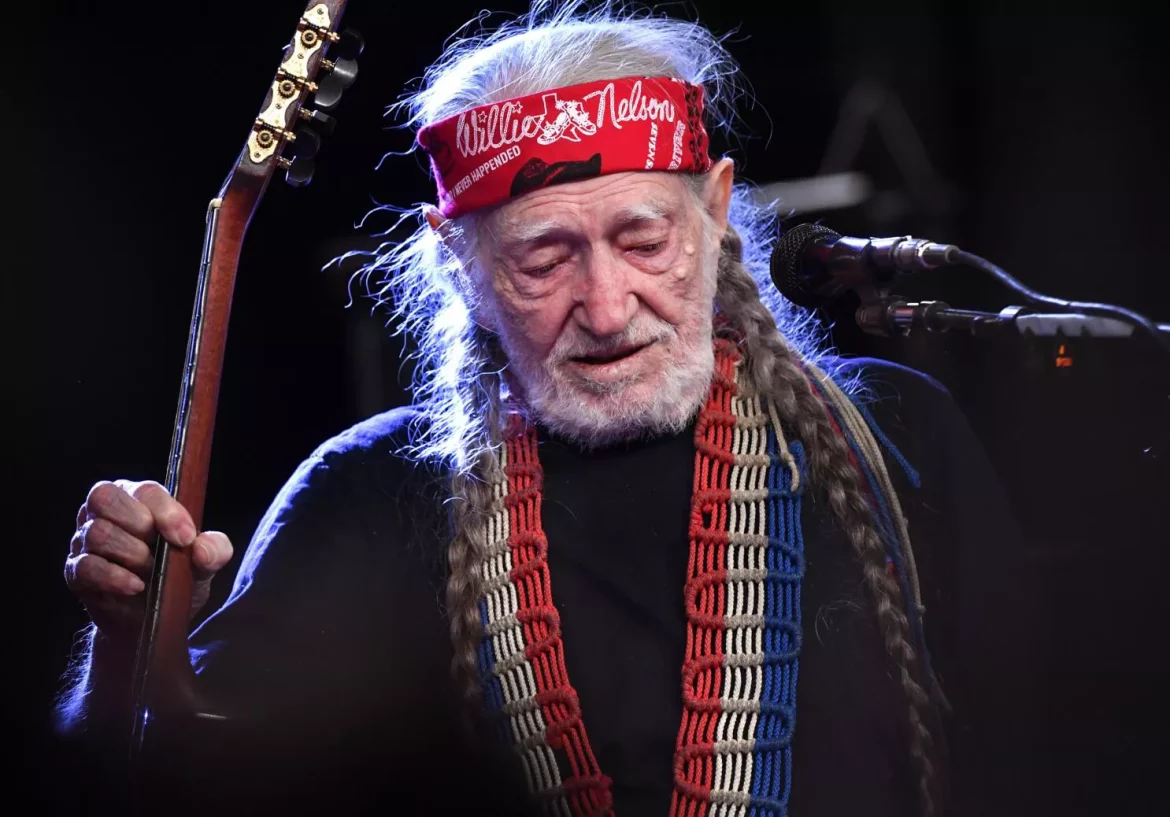Willie Nelson is a name synonymous with outlaw country music. This genre, which emerged in the 1970s, is characterized by its rebellious spirit and departure from the polished sound of mainstream Nashville. Willie Nelson, along with contemporaries like Waylon Jennings, Johnny Cash, and Merle Haggard, played a pivotal role in defining and popularizing this style.
I. Early Life and Career Evolution
1. Childhood and Early Musical Ventures
Willie Nelson’s early years in Abbott, Texas, were shaped by a love of music and a close-knit family. His grandparents, particularly his grandmother, were his first musical mentors. She taught him to play chords on a guitar when he was just six years old. Nelson and his sister, Bobbie, played music together throughout their childhood.
By his teenage years, Nelson was writing his own songs and performing locally. He joined various bands and even worked as a DJ, gaining valuable experience and exposure. His early influences included Western swing bands, gospel groups, and the popular country music of the era.
2. Nashville Struggles and Songwriting Success
In the late 1950s, Nelson made the move to Nashville, hoping to establish himself in the heart of the country music industry. Despite his undeniable talent, he found it challenging to break through as a solo artist. His unconventional voice and style didn’t fit the mold of the polished Nashville sound.
However, Nelson’s songwriting skills did not go unnoticed. He penned several hits for other artists, including “Funny How Time Slips Away” and “Night Life.” His songs were covered by numerous artists, helping him gain a reputation as a gifted songwriter.
3. The Texas Renaissance
Disillusioned with Nashville, Nelson returned to Texas in the early 1970s. This move marked a turning point in his career. Texas offered a more relaxed and accepting environment for Nelson’s music. He began to perform at venues like the Armadillo World Headquarters in Austin, where his eclectic style resonated with audiences.
4. The Making of “Shotgun Willie”
Nelson’s 1973 album “Shotgun Willie” is often considered the beginning of his outlaw country phase. The album was a departure from the Nashville sound, featuring a blend of country, blues, and rock. Its raw, unpolished sound and honest lyrics set it apart and helped define the outlaw country movement.
5. “Red Headed Stranger” and Its Impact
Nelson’s 1975 album “Red Headed Stranger” further solidified his status as an outlaw country icon. The album is a concept piece that tells the story of a fugitive on the run after killing his wife and her lover. Its minimalist production was a stark contrast to the lush arrangements common in country music at the time.
The success of “Red Headed Stranger” proved that there was an audience for Nelson’s unique brand of country music. The album included the hit single “Blue Eyes Crying in the Rain,” which became one of Nelson’s signature songs.
6. Stardust: A Different Kind of Outlaw
In 1978, Nelson released “Stardust,” an album of American pop standards. This project was a departure from his outlaw image but showcased his versatility as an artist. The album was a commercial success and included hits like “Georgia on My Mind” and “Blue Skies.”
7. The Highwaymen: Outlaws Unite
In the mid-1980s, Nelson joined forces with Johnny Cash, Waylon Jennings, and Kris Kristofferson to form The Highwaymen. This supergroup embodied the outlaw country spirit, and their 1985 album “Highwayman” was a critical and commercial success. The title track, “Highwayman,” became an anthem for the outlaw movement.
II. Key Albums and Hits
“Shotgun Willie” (1973): This album is often cited as the start of Nelson’s outlaw phase. It features a blend of country, blues, and rock, with a raw sound that set it apart from mainstream country music.
“Red Headed Stranger” (1975): This concept album tells the story of a fugitive on the run after killing his wife and her lover. Its sparse, minimalist sound was revolutionary at the time. The album includes the hit “Blue Eyes Crying in the Rain.”
“Stardust” (1978): A departure from his outlaw sound, this album features Nelson’s renditions of American pop standards. It was a commercial success and showcased his versatility as an artist.
III. Honors and Legacy
1. Honors and Awards
Over his illustrious career, Willie Nelson has received numerous honors and awards. He has won multiple Grammy Awards, including a Lifetime Achievement Award. Nelson has also been inducted into the Country Music Hall of Fame and the Songwriters Hall of Fame. His contributions to music have been recognized with a Kennedy Center Honor and a Gershwin Prize for Popular Song.
2. Continuing to Create
Despite his age, Willie Nelson remains active in the music industry. He continues to tour and record new music, proving that his passion for his craft is as strong as ever. His recent albums have received critical acclaim and demonstrate that he is still at the top of his game.
3. Influence on Modern Country
Willie Nelson’s influence can be seen in the work of many modern country artists. His emphasis on authenticity and storytelling has inspired a new generation of musicians. Artists like Sturgill Simpson, Chris Stapleton, and Kacey Musgraves have cited Nelson as a significant influence on their music.
4. Influence on The Spirit of Outlaw Country Today
The spirit of outlaw country lives on today, thanks in large part to Willie Nelson. The genre’s emphasis on artistic freedom and rebellion against the mainstream continues to resonate with fans and artists alike. Nelson’s legacy is a testament to the enduring power of music that is genuine, heartfelt, and true to one’s self.
See Also: A Deep Dive into Rancheras: a Genre Rooted in Mexico
IV. Conclusion
Willie Nelson’s impact on outlaw country music cannot be overstated. He is a true pioneer whose influence continues to resonate in the genre today. His music, characterized by its authenticity and emotional depth, has earned him a place as one of the most respected and beloved figures in country music history.

